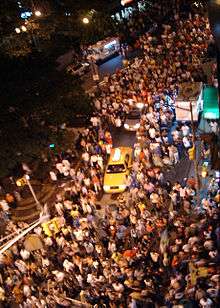Crowd


A crowd is a large group of people that are gathered or considered together. The term "the crowd" may sometimes refer to the lower orders of people in general (the mob). A crowd may be definable through a common purpose or set of emotions, such as at a political rally, a sports event, or during looting (this is known as a psychological crowd), or may simply be made up of many people going about their business in a busy area.
Terminology
The term crowd is sometimes defined in contrast to other group nouns for collections of humans or animals, such as aggregation, audience, group, mass, mob, populous, public, rabble and throng. Opinion researcher Vincent Price compares masses and crowds, saying that "Crowds are defined by their shared emotional experiences, but masses are defined by their interpersonal isolation."[1]
In human sociology, the term "mobbed" simply means "extremely crowded", as in a busy mall or shop. In animal behaviour mobbing is a technique where many individuals of one species "gang up" on a larger individual of another species to drive them away. Mobbing behaviour is often seen in birds.
Social aspects
Social aspects are concerned with the formation, management and control of crowds, both from the point of view of individuals and groups. Often crowd control is designed to persuade a crowd to align with a particular view (e.g., political rallies), or to contain groups to prevent damage or mob behaviour. Politically organised crowd control is usually conducted by law enforcement but on some occasions military forces are used for particularly large or dangerous crowds.
Psychological aspects
Psychological aspects are concerned with the psychology of the crowd as a group and the psychology of those who allow their will and emotions to be informed by the crowd (both discussed more comprehensively under crowd psychology), and other individual responses to crowds, such as claustrophobia, agoraphobia and social anxiety. At a general level, crowd psychology is concerned with the behaviour and thought processes of individual crowd members and the crowd as a whole. Given the prevalence of crowd events, and the potential safety issues associated with such large gatherings of people, the topic is receiving increasing attention from agencies responsible for crowd management and also from governments.
Many studies on crowds have given insights on how crowds respond to different situations. One 2009 report highlighted many observable behaviors of crowds,[2] including evidence that crowds are able to make united decisions regarding their direction and speed of movement, even if only a few of its members have the information required to make such decisions.[2] The degree to which informed members can affect the crowd depends on their position within the group, with those in the crowd's core likely to have a greater influence.[2]
See also
References
- ↑ Public Opinion By Carroll J. Glynn, Susan Herbst, Garrett J. O'Keefe, Robert Y. Shapiro
- 1 2 3 Challenger, R., Clegg, C. W., & Robinson, M. A. (2009). Understanding crowd behaviours. Multi-volume report for the UK Government’s Cabinet Office. London: Cabinet Office. http://www.cabinetoffice.gov.uk/resource-library/understanding-crowd-behaviours-documents
External links
| Look up crowd in Wiktionary, the free dictionary. |
| Wikimedia Commons has media related to Crowds. |